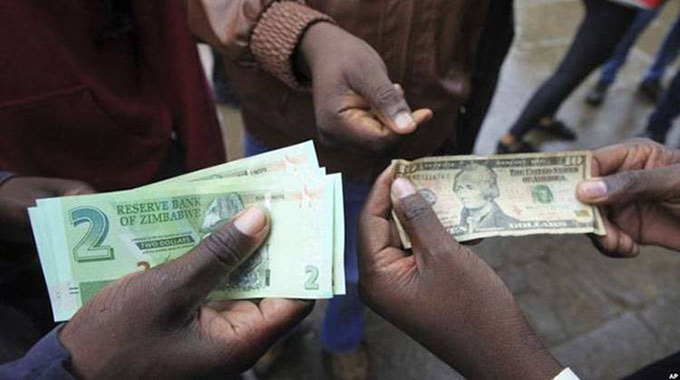Source: EDITORIAL COMMENT : Forex black market: Let’s fix what needs to be fixed | The Herald November 26, 2019
Killing the black market is not a simple task. Either legal supplies have to be raised to meet or exceed demand, or demand has to be reduced.
But given a scarcity on the supply side, whether because of low or lack of input, and given demand, then someone, somewhere will be willing to supply at a profit.
So we had rum runners breaching American prohibitions, we have drug dealers breaching anti-drug laws, we have seen farmers getting around potato rationing, and in Zimbabwe we have an intricate network feeding US dollar notes from Diaspora remittances into a well-organised accumulator system for importers.
Most people do not see this forex back market as intrinsically evil, so there is little motive to call the police to break it up. And many find it a convenient way of getting hold of small sums in US dollars.
Few see the damage that it causes, by starving the legitimate interbank market, and thus raising prices and few see the masterminds near the top of the accumulating pyramid becoming rich by exploiting everyone else.
Attempts to disrupt supply are a non-starter. Zimbabwe needs Diaspora remittances and those millions of little money orders coming into the country each year add up to a sizable percentage of our foreign exchange inflows.
Disrupting the trade has been shown to be ineffective. The odd raid on pavement dealers does not really do much good or harm.
The Ministry of Finance and Economic Development has thus decided to follow what is almost certainly the only effective path, slashing back demand.
While Reserve Bank of Zimbabwe (RBZ) has said importers with free funds can continue importing goods without being asked their source of funds, we support proposals to introduce tighter controls around foreign currency.
Whether these controls should go as far as making it mandatory for importers to declare their source of foreign currency is debatable.
We see the sense of wanting to know the source of foreign currency given what has been obtaining on the market.
Worked properly, this proposal should dramatically reduce demand for black market US dollars, and probably reduce it to levels where the premium on the interbank rate is so low that it becomes difficult to make a profit from working on the pavement rather than legally.
The net effect of slashing demand in the black market and reducing the premium to negligible levels should be to see more of the supply enter the formal interbank market.
People who feed the black market do so because they get more money for their US dollars; but if they did not then formal banks and bureaux de change would be a lot more attractive, if only because they are safer.
There are others, of course, besides importers who want foreign currency for legal use and who have had to resort to the black market.
People go on holiday, they want to send money to children at college outside the country, they want to buy something on Amazon.
In theory, these people are supposed to use either their bank or, more likely, a bureau de change and pay a small premium for cash.
The Finance ministry has already put in quite a liberal set of rules governing bureaux de change and their customers and has deliberately made it easy for people to do small foreign exchange transactions with little or even no paperwork. But the bureaux can be monitored and if they step out of line can be regulated more tightly or even closed.
The objective of a lot of legislation, including the proposed legislation, is not to make life difficult for the ordinary person, but to move Zimbabwe into the normal world where everyone changes money quickly and conveniently at some legal counter.
The Confederation of Zimbabwe Retailers and the Zimbabwe Cross Border Traders Association have been fairly positive in their comments on the announcement.
Both have a lot of members partly or wholly reliant on the black market, directly or indirectly and yet both would like to see a more organised system.
Their main worry is that the legal system is some distance from perfection.
If the interbank market and bureaux de change worked the way they were supposed to then both associations would be a lot less worried, retailers tending to use their banks for direct imports and cross border traders, no doubt, using the bureaux.
The ministry can retort that once the black market crashes then the legal channels should work a lot better, as indeed they should.
But as Zimbabweans know, what seems logical to an economist does not always work on the ground, and the plea for consultation and for ensuring that what needs fixing is indeed fixed does not seem unreasonable.
Newer Post
Zanu-PF indaba preps almost complete Older Post
Teachers’ welfare under spotlight 
COMMENTS
Zanoids are incapable of fixing anything. Face facts.
Rule no 1. No government has ever been able to control or fix the black market. It is simply impossible. Roll another reefer.
To fix the ZW black market in currency you have to abolish exchange control act. The Act that the murungus brought in, in 1961. There has been a black market since 1961 and few people will admit it. Especially the murungus comrades.
When will we ever learn ?
Its so easy to fix , every morning the Reserve Bank should just auction off US$100,000 in tranches or lots of US$1,000 to the highest bidder .
Anyone should be allow to bid for the forex Lots
That highest bid becomes the price for the day
Mmmm..and the Government would be furiously printing Zim dollars every night to outbid everybody in the morning no matter what price.